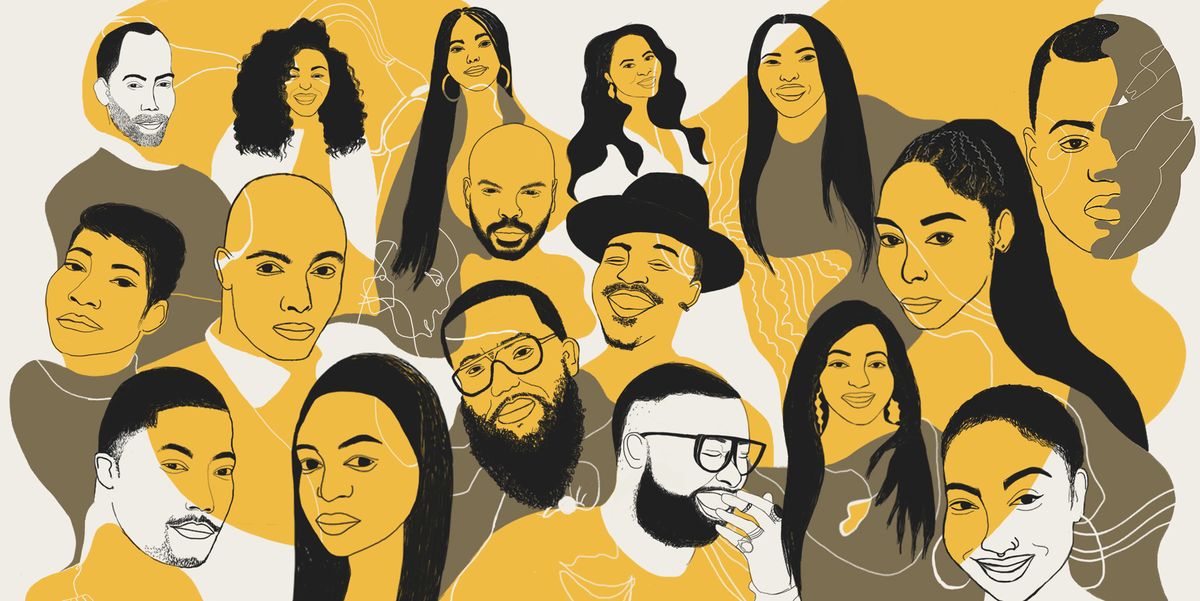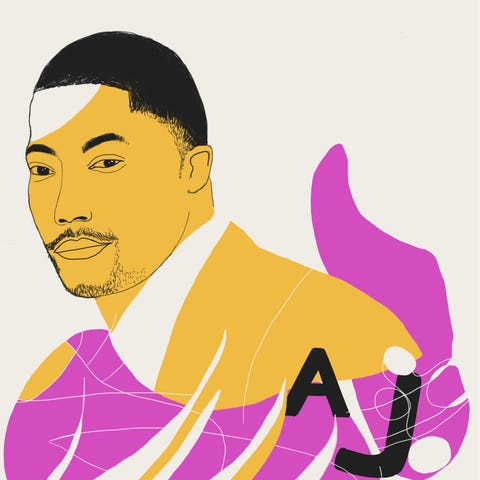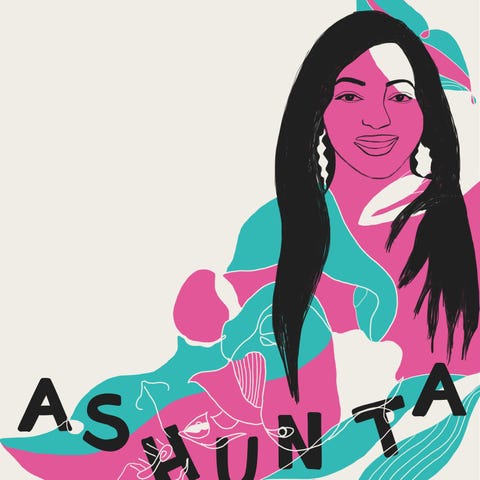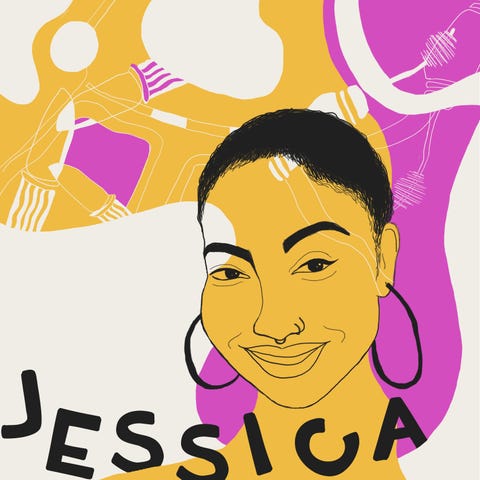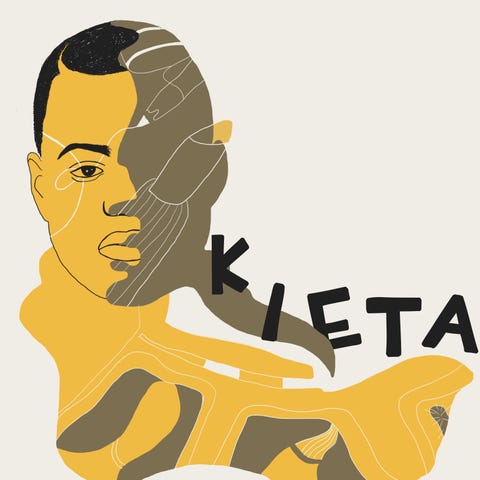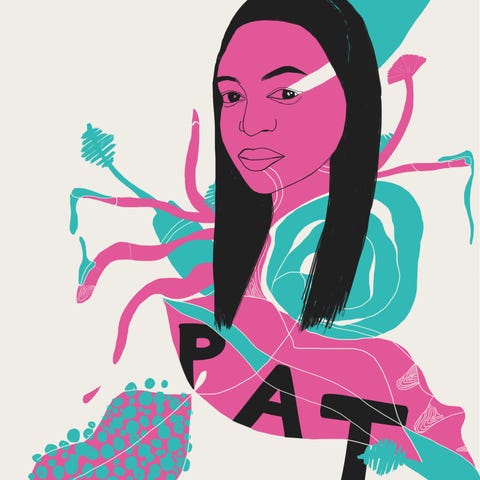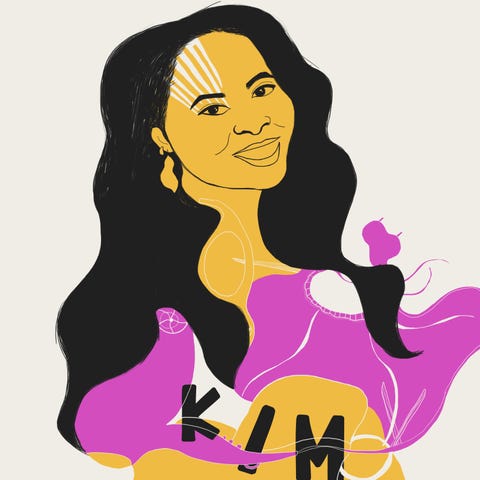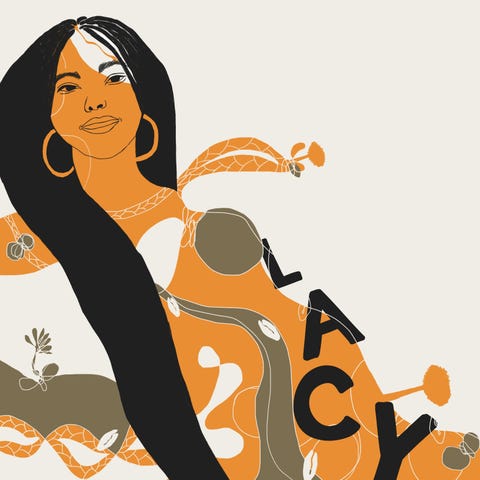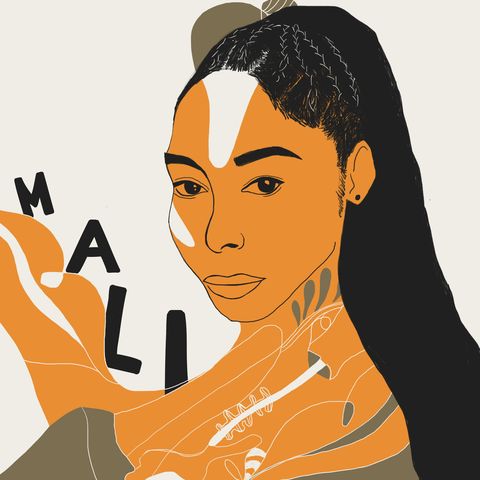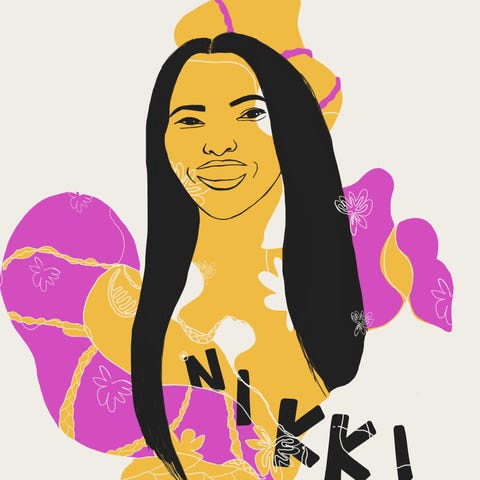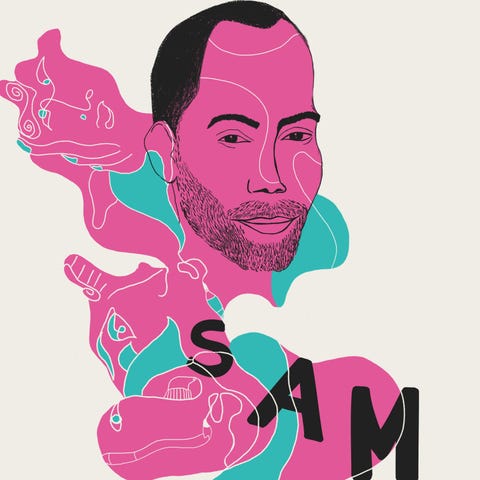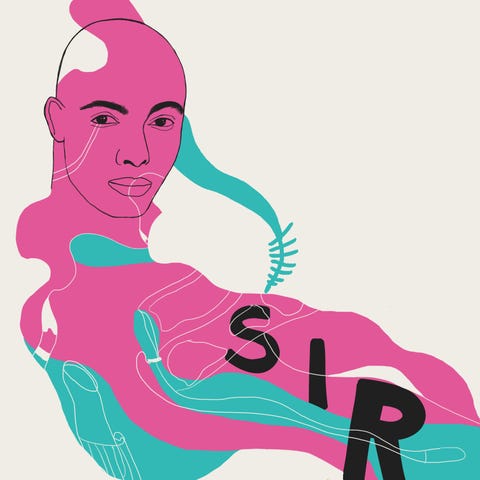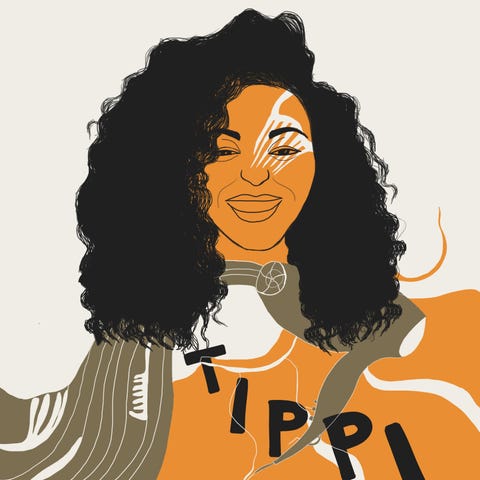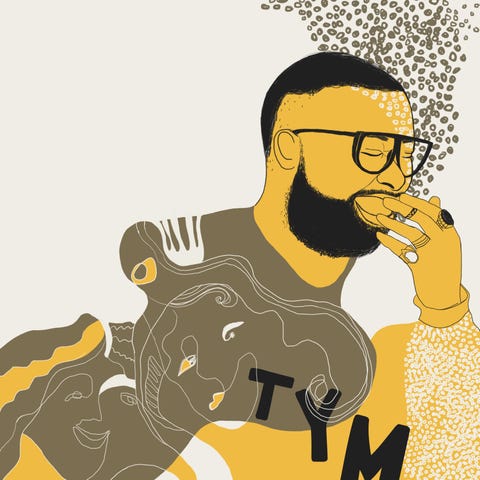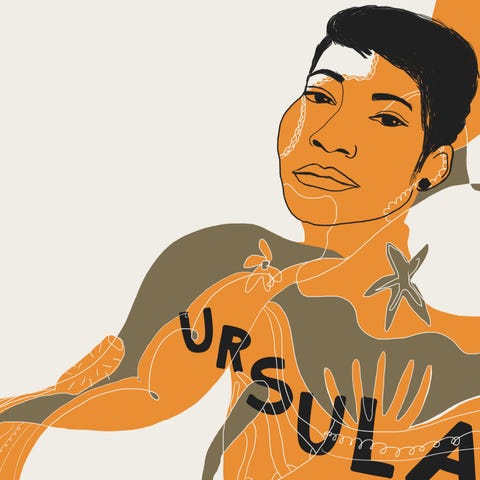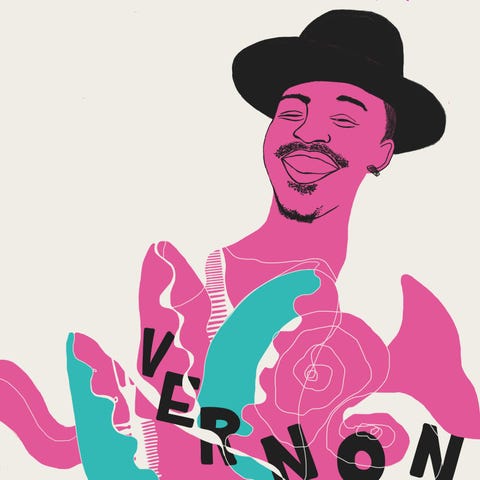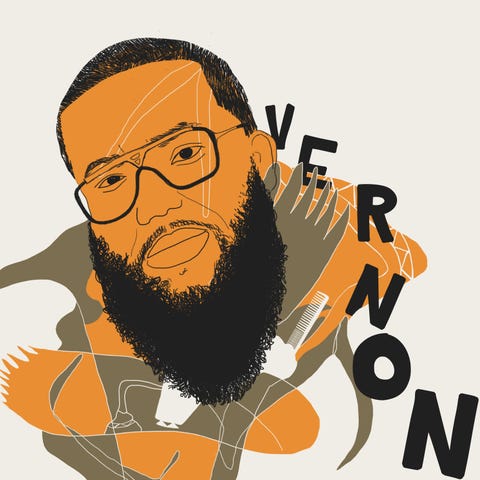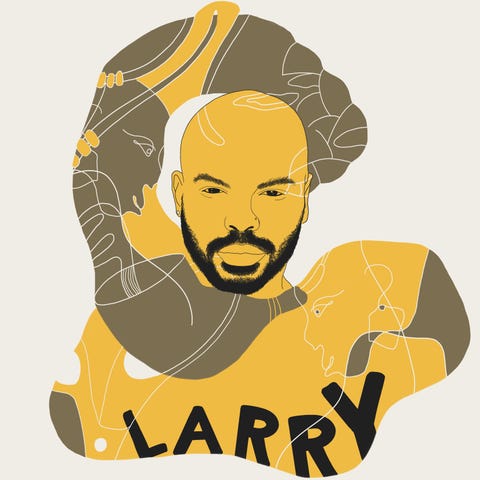Black people working in the beauty industry are required to not just be high-level performers but shapeshifters able to comport themselves in reaction to whatever is thrown their way. Most times, that means staring the industry’s storied history of blatant discrimination and half-baked diversity in the face. Black models are the first to point out that high fashion backstages are often a wasteland of familiar faces and beauty companies who—until very recently—rarely made foundation and concealer shades that went beyond “honey” and “toasted almond.” In the wise words of Scandal’s Papa Pope: “You have to be twice as good as them to get half of what they have.” Black creatives have to master the whole spectrum of skills—from learning how to apply makeup on every skin tone to expertly weaving hairstyles for different hair textures—where their counterparts often need to master technique for only one type of skin: white. This only makes what Black hair and makeup artists have accomplished that much more astonishing.
In the chaos of the industry, artists have found power. Celebrity hairstylist Larry Sims is responsible for allowing textured hair to be showcased on America’s Got Talent. Vernon Scott stayed up all night before the 2018 Oscar’s to create Black Panther actress Danai Gurira’s hair moment with her African tribal design painted onto her shaved head that graced the carpet. Sir John harnessed his talents to help Beyoncé create an experience more mind-warping than any other substance out in the Coachella Valley.
It’s our duty to celebrate those tastemakers and innovators who give the world beauty from behind the scenes. Below, ELLE.com talked with 17 of the most influential individuals in the hair and makeup game to celebrate their excellence. What inspires them to create? How do they define Black beauty, and how do they feel about their legacy in the world? Let the art serve as a thank you to those innovators named below and the countless others that hustle for Black culture. The beauty industry never designed a level playing field for all creatives to succeed. But that never stopped so many of the industry’s culture-defining names from making noise.
AJ Crimson
On the power of makeup, his influences, and investing in Black brands
“My relationship with beauty started watching soap operas with my grandmother as a kid. The opulence was what I recall noticing right away. It wasn’t until I began working in the music business that I truly started to focus on beauty. At first, I was interested in developing the outside beauty perception of a musical artist. Then, it evolved to helping people match their outer beauty to their inner beauty via my brand philosophy—that’s what AJ CRIMSON Beauty has been about. Makeup is just a co-star to the beauty you already showed up in the world with.
Growing up, I looked to Reggie Wells, Sam Fine, Kevin Aucoin, Billie B, D’Andre Michael, and Scott Barnes as references. I was inspired by [Beautyblender founder] Rea Ann Silva’s work, especially with Brandy. As an extreme Brandy fan, I wanted to someday create something as beautiful as the Full Moon album cover Silva had done. Sharon Gault gave me some of my first opportunities in pop music, Desire Diggs showed me how to be a Key Artist, unselfishly and patiently. Mathu Anderson pushed me to embrace my art in my makeup, encouraging me to think out of the box. Joann Gair gave me a passion for artistic expression with makeup. Pat McGrath inspired me to think bigger and not operate on scared money. She demonstrated an elevated form of beauty and leadership. I began to make a name for myself armed with all these wonderful experiences those amazing artists poured into me.
The best part of the lack of care to be diverse is that it has catapulted a new group of beauty entrepreneurs into the space that is inclusive from the core of its DNA. Indie brands like AJCRIMSON Beauty and others in my category have forced the industry to shift the way they view inclusivity. Where inclusivity is normal, not a trend. Where customers know from the onset it’s about them and they see it from the leadership to the support to the products arriving at their doorstep.
Brands need to keep listening, implementing change and embracing change, advocating for diversity, and hiring from the top down. Be the real change, not just marketing the idea that something has changed. Invest in Black brands the way you would white-owned brands.”
AJ Crimson is the founder and CEO of AJ Crimson Beauty. You’ve seen his makeup artistry on Christina Milian, Brandy, Raven-Symone, Estelle, Regina King, Angela Bassett, Ameriie, Letoya Luckett, Keyshia Cole, Missy Elliot, and more.
Ashunta Sheriff-Kendricks
On foundation ranges and the lineage Black artists are creating
“I was exposed to beauty from a young age. I found myself going to the MAC store, constantly playing in makeup, helping strangers out with their makeup, giving them advice, even trying on shades on people. It got to a point where the manager at the store at the time told me I should apply to that specific MAC store since I was always there. And that’s how I got my start at MAC.
MAC was really the brand that all makeup artists were using at the time because it had a shade range that worked for a diverse group of women of color. I can go from a Latinx client to an Indian client, to a Caribbean client, to an African client, and I would have all my needs met through MAC. Then Make Up For Ever came up behind that. Both brands were really ahead of the curve for realizing that there aren’t just brown people. There are brown neutral people, so they need neutral colors. They are brown warm people. They’re brown cool people.
I think the last five years have been amazing for beauty. On the product side, inclusivity is present and very important to brands. And if brands refused to get with the program, people came out with their own brands. But I think that mainstream society has a one-dimensional perspective of what is Black. The industry can be better by simply asking a beauty professional questions instead of beauty influencers. If you’re an influencer doing your own makeup, I don’t think that they’re going to have the expertise to tell me about shade range, because you’re only doing your own skin. The beauty industry needs to go back to the model that they once had, where professional artists of color come in and discuss.
You could be a general making command from your high-post office, but you’re not on the ground doing the work. If you’re not the soldier on the ground doing the work, you don’t know what it takes to actually survive the mission. So that’s where I feel like there’s a disconnect happening in beauty; brands need to go back to the trenches and get back with the people who are on the ground doing the work so that they get it right the first time.
I want to just reach women of color and I want them to know they can follow their dreams too. No one gave me any one-on-one lessons. I learned everything on my own. I was blessed enough to meet with people like Pat McGrath, and Vincent Longo, Charles Green, or Reggie Wells, who was Oprah’s makeup artist for the majority of her entire time with television. [Reggie] inspired Sam, Sam inspired me. It’s a lineage we’re creating, and it’s really dope to be a part of it at the forefront of beauty.”
Ashunta has over 20 years in the beauty biz molding and creating her own signature flawless clean beauty technique. Some of Ashunta’s master teachers and mentors are Vincent Longo, Laura Mercier, Charlie Green, and Pat McGrath where she assisted on their teams for high fashion runway shows worldwide. You’ve seen her makeup artistry on Zendaya, Janelle Monae, Rihanna, Meagan Good, Taraji P. Henson, Tracee Ellis Ross, Alicia Keys, Tessa Thompson, Ciara, and more.
Jessica Smalls
On childhood imagery and supporting Black creatives
“My biggest Black beauty inspiration is my mommy and my aunts. I grew up watching them get ready for parties or big family events. Pulling out their fashion flair, their foundations, and powders and Using lighters on their eyeliner to make them apply more smoothly. Even applying their Lee Press On Nails, they were sexy and fabulous! I remember I wanted to be just like them when I grew up, and now look at me, I’m knee-deep in makeup. But, the industry needs to work to hire more Black artists to work on clients of all skin tones. Being a black artist is almost like a handicap. No matter how gifted and skilled you are, they’ll mainly request you for Black clients. It feels like we have to work twice as hard and be 2x better than to be considered for jobs. We also need to make sure non-Black artists can properly assist their Black clients. You don’t know how many times I’ve worked on sets where the Black models will come up to me and ask me to do their makeup because they don’t trust the skill set of a non-Black artist.”
Jessica Smalls is a New York-based makeup artist. Born and raised in Harlem, Jessica was diagnosed with a rare skin cancer at the age of 18. The illness led to her explore the world of beauty – a realm that restored her sense of self, fueled her artistic passion and empowered her to see beyond societal standards of Black women. You’ve seen her makeup artistry on Janelle Monae, Mary J. Blige, Omari Hardwick, Nia Long, Ava Duvernay, Yara Shahidi, Usher, Miguel, Cardi B, John Legend, and many more.
Keita Moore
On the lack of opportunities afforded Black makeup artists, diversity in campaigns, and the future of beauty
“As a makeup artist coming up in the industry, I always had to work two, three times as hard to be noticed. I’ve been on sets where for campaigns and heard people say, Oh, let’s give him all the Black girls. And it’s like, ‘But wait, I can do all skin types.’ I love to do the Black girls, but I would like my work to be displayed in all shades and all tones. We have a lot of white artists who have the opportunity to work on Black skin, so why can’t we display our art on other tones?
Why can’t we showcase our talent so that we, too, can get more opportunities? Black makeup artists aren’t afforded the same opportunities as our white counterparts. We’re really not able to work on women who don’t look like us. It’s a little bit harder for me to walk in a room and get a job with Angelina Jolie, or Nicole Kidman, or Kim Kardashian, you know? It makes you wonder, Am I not good enough? Did they pass because I am a black artist?
I feel like the industry could be better if it was a little bit more diverse. I don’t see a lot of Black artists on beauty campaigns. When I walk into a room, sometimes I’m the only Black artist on the set. And I would just like to see more diversity behind the scenes. I want more Black artists to feel encouraged and empowered.
I love the fact that I have a lot of Black artists who DM me or email me and tell me their stories. One person even told me that my journey is the only thing that keeps them going. I want people to be able to say, Hey, if Keita did it then I can walk into those rooms. I can get these clients. I can win this award. I can work on this campaign.
The Black Lives Matter movement opened up the eyes of a lot of brands and opened a lot of doors for black actresses. Black actresses are getting more covers, which opens up more jobs for Black artists. When they get campaigns, it allows us to come in those rooms, and get those campaigns, and get those covers. I’m very optimistic about the future of beauty.”
Keita Moore is a New York-based celebrity makeup artist. He was drawn to the makeup industry after he had initially studied art. Realizing the connection between art and beauty, Keita wanted to see his vision come to life. You’ve seen his makeup artistry on Dascha Polanco, Fantasia, Naturi Naughton, Kahlana Barfield, and Chantel Jeffries.
Dame Pat McGrath
The mother of all makeup
Pat McGrath is regarded as one of the beauty industry’s icons. “Innovative,” “legend,” “pioneer” are distinctions that have followed the Jamaican-British makeup artist since her catapult to prominence in the 90s. To be a fly on the wall throughout McGrath’s career would find you on fashion shoots at i-D Magazine where she worked with Edward Enninful during his tenure at the magazine; Backstage at couture shows where she whipped up elaborate, avant-garde makeup looks with embellishments and feathers adorning the faces of models for likes of Christian Dior, Maison Margiela, Alexander McQueen, and more. In 2015, her decades-spanning career of experimental makeup inspired her to launch the beauty brand that would go on to disrupt the industry with alluring, spell-binding hues and an extension foundation shade range.
Kim Kimble
On the tie of popular culture and Black culture
“From a very early age, I used to dress up my dolls and play with their hair. I would craft their hairstyles and color them in with markers. My grandma also used to do my hair for church every Sunday and would do hot oil treatments with castor oil. Style is important, but growing up my grandma put a lot of focus on taking care of my hair and taught me that healthy hair is always the foundation for everything, which is what led to my love and emphasis on hair care with Kim Kimble hair products.
Coming into the industry as a young, Black female it was a lot tougher to convince people to trust in my skills. I often felt very underestimated. It took time for people to become confident in my work. Once higher-ups in the industry began to see the work I was doing on my clients and I began to gain recognition, I was given more chances and things really took off. I recently launched a line for natural hair with Walmart and they opened their doors for an exclusive line with a lot of products and tools. This was a major launch for a woman of color but also a win for making these products more accessible to women and men of color with natural hair types. Each generation gets stronger in understanding ourselves. Each generation falls more in love with their bodies, hair types, and culture with the support of the generations that came before them. Popular culture is heavily tied to Black culture, so the more we see ourselves celebrated in hashtags like #BlackGirlMagic or movies like Black Is King, the more people demand to be seen in products that meet their needs. The industry has no choice but to step up, listen and evolve.”
Kimberly Kimble is the woman behind the Kim Kimble empire. She’s worked on countless magazine covers including ELLE, alongside national campaigns for Pepsi, Neutrogena, and Nike. You’ve seen her hair artistry onBeyoncé, Nicki Minaj, Brandy, Kelly Rowland, Mary J. Blige, Halle Berry, and Shakira.
Lacy Redway
On the diversity and inclusion work that needs to be done at fashion shows’ backstages
“I feel like right now in fashion being Black is seen as ‘trendy’ right now, which is upsetting for me because we want to be seen as equal and accepted in the fashion space, but it feels like it’s almost like a new purse, in some ways, because right now it’s trendy to have Black models go down a runway with cornrows. There are braiders that are being outsourced from Black hair salons for the show but they’re still not getting the recognition, they’re still not getting the credit. So essentially they are coming in and designing these hairstyles, most of the time the key can’t do, and the key will put their name on it without crediting the braiders or the hair salon or anything like that. Still to this day, you rarely see a Black key hairdresser backstage, and not just a Black key, a Black key woman, we are not really keying any shows. There is still a lot of work that needs to be done backstage. I would love to see more people who understand the culture, the hairstyles, and where they originate from so we don’t have to have these conversations with big fashion houses. I would love to see more opportunities happening for more people and for more women of color. Black hair is so malleable, I would love to see more designers and artists get more creative with Black hair. Now that cornrows are an acceptable hairstyle for Black models on the runway, I would love to see everyone get more creative. I would love to see more hands backstage that understands our hair type and texture.”
Lacy Redway is a hair innovator and genius. You’ve seen her command of all textures and curl patterns in glossy publications like Allure, Elle, Teen Vogue, Vogue, Vogue Italia, and Vanity Fair to name a few. Her stacked client roster includes Angela Bassett, Gabrielle Union, Tessa Thompson, Karlie Kloss, Yara Shahidi, Awkwafina, Olivia Palermo, Elizabeth Olsen, and Tiffany Haddish.
Mali Magic
On her grandmother’s impact and the power of the Black dollar
“My biggest Black beauty inspiration is my great grandmother Hattie. She was born in the late 1800s in Alabama and was the first entrepreneur in our family. She owned a juke-joint that has been in the family for many years. This place served many hard-working black folks that needed a place to escape daily hardships. She was described as being well dressed, fierce, and fearless at a time where it was impossible to be any of those things as a Black woman in the deep south. Awareness of my lineage has been integral to my journey.
My career began in New York City which I consider to be one of the most humbling cities. Instagram just emerged on the scene and you couldn’t hide behind a social following or filters. You had to really deliver quality work. Photographers were meticulous and challenged me to create clean beauty. No one was giving out free compliments or heart emojis. They told you the truth. The Mali Magic umbrella has created opportunities for up and coming brown models, hair and makeup artists, as well as education and mentorships.
What I would love is to see and hear more from mature beauties. Women are not disposable when they reach a certain age. We’ve added some mature models to the mix, however, it’s not enough. Their beauty journey is intriguing and is a constant source of inspiration. Whether or not brands have been genuine in their efforts to be more inclusive, they can’t deny our buying power. Numbers in social influence and dollars have taken precedence over a brand’s disparaging viewpoint. Research shows that people of color spend approximately 1.2 trillion per year on beauty. Not only have we forced the industry to change, but we became part of the change. There are more Black entrepreneurs in the beauty industry now and I am one of them.”
Nigerian-born Mali Thomas finds her makeup inspiration through visual art. She began on canvas and moved to the face, a medium that would stay with her. She counts Kevyn Aucoin, Way Bandy, Jean-Michel Basquiat amongst the list of inspirations. You’ve seen her makeup artistry on Nicki Minaj, Niecy Nash, and Tiffany Haddish.
Nikki Nelms
On finding true equality in the industry
“My relationship with beauty began when I was a little girl. I loved to watch my mom do her hair and makeup when she was getting ready to go out. I actually still do. She’s my biggest beauty inspiration. Looking at old photos of my mom from the ’70s, she was so fly and stylish. I noticed early that a lot more effort went into getting dressed the more special an event was. That always made me want to get dressed up or help someone else to get dressed up. But because I’m from a small city in Florida, I didn’t start off feeling like I had easy access to having a career as a session stylist. I always had to factor in working harder than most to make it. I normalized working hard early, which has resulted in really special moments. I would love to see the day when Black hairstylists are allowed to just be hairstylists like everyone else, without being placed in a specialty box. True inclusivity doesn’t happen through separation.”
Nikki Nelms aka Hair MacGyver is one of the most innovative and ingenious stylists in the game. Known for her grafity-defying, cutting-edge, couture styles, she has been featured on the pages of ELLE, Vogue, and Allure to name a few. You’ve seen her hair artistry on Zoe Kravitz, Janelle Monae, and Laura Harrier.
Sam Fine
The most influential man in makeup
When you think of the greats of Black Excellence, chances are these names end up on your list: Iman, Naomi Campbell, Tyra Banks, Veronica Webb, Mary J Blidge, Queen Latifah.
Sam Fine, the legendary makeup artist is the man behind the greats. Fine has been perfecting skin, letting brows be brows, and shifting the pop of color lip trend for decades. When we talked to the fellow innovators and tastemakers, they each mentioned the work of Fine as inspiration. He’s left a legacy, not only with his book Fine Beauty, catered to guide Black women in beauty, a consumer who is rarely ever catered to, but he continues to evolve and expand with his influence in other greats who are changing the beauty game. From countless covers to painting the face of Vice President Kamala Harris, Fine is defining Black beauty and lifting others with his legacy and dedication to the craft.
Sir John
On the power of Black beauty and opening doors for others
“Black beauty is omnipresent. Everywhere at once. When I think of Black beauty, I think of any and every person that has originated from the diaspora throughout the world. Our features and melanin are everywhere and have cascaded out all throughout the globe.
When I first started in beauty, the industry was bleak. I was working backstage at fashion shows. I didn’t see anyone who looked like me. I didn’t see any of my people anywhere. There was a serious lack of diversity. We grew up in an industry that did not celebrate uniqueness—it celebrated sameness. There was a very small view of what was beautiful. My interest in beauty began as a young boy watching my mom—who I thought then was and is still today the most beautiful woman in the world. I observed how she applied her mascara or how she would just go in the bathroom and give herself moments of self-care like washing her face with Noxema. All these things were sort of a ritualistic way to lean into herself. I learned self-care from my mom. My relationship with beauty has changed over time because I don’t have a singular relationship with anyone woman but every woman from all around the world. Them being able to see themselves is what motivates me.
I feel very blessed and fortunate to [be considered a beauty icon]. It does not conflate my ego or make me feel better than anyone, it actually gives me quiet guidance. Knowing that I’m recognizable, knowing that people are counting on me to make impactful decisions. Occupying these spaces grants me the responsibility of opening the door for others; It makes it so that I have to campaign so that I am not the only person of color in the room. It’s a responsibility that makes it so the next generation of artists coming behind me don’t have to fight as hard to get the same rates, same covers, same contracts, and the same clients as their white counterparts. One thing that has changed in the business is that the people have the power now. The business did not change because it wanted to, it didn’t want to lean into newness. It was led by the democracy of social media, cultural shifts, and a collective fight for justice. The protests that happened during summer 2020 made a huge impact. I look at social media as being the gift and the curse. The gift is that it has led us into a really equitable place where everyone can use their voice. You can’t help but feel a part of the movement and help continue the conversation. You need diverse voices, faces, and backgrounds in all of the decision-making areas. That’s where true change will be ushered in from.”
Sir John, a Global makeup artist, and activist has been defining and shaping the beauty industry since his start a decade ago. SJ grew up in update New York and began taking art classes as young as six. Now, one of the most recognizable names in beauty his work includes covers, tours, campaigns, and more. You’ve seen his makeup artistry on Joan Smalls, Barbie, Ashley Graham, and the one and only Beyoncé.
Tippi Shorter
On the beauty of the Black community and lifting up Black voices in boardrooms
“I grew up in Southern California and I spent the first 20 years of my life there. And then the next 20 years of my life in New York, I’ve always lived where it was culturally diverse. So I found it to be so interesting that when I started working in the beauty industry on the corporate end and I’m not corporate, it is still very creative. But when I started to sit in the rooms with the powers that be in the corporate space, it was not like my neighborhood. It was not like my school. It was not like anything. I was the only brown face in the room. What I have been always telling people is like, okay, you know, if you want to make an impact on the people around, you need to represent who you’re seeking to speak to because you can’t speak for everybody. People will give me the room and they’re just like, tell us what Black women want. I’m like, no, because I’m not everybody on it. I can speak for myself and for people who think like me, but I can’t speak for everybody. So you need multiple perspectives. My goal was to not only help change the visibility of how we got to see ourselves in the media but also help change the visibility of us in those boardrooms. Every opportunity I get to bring someone in or add to the team or, I definitely took those opportunities. What I love about Black hair is the diversity and the diversity in our hair. You can line up 10 black women and you’ve got so many different textures and different shapes. The diversity of us is incredible and beautiful. The beauty of the Black community is for me the love and support of our culture and the diversity.”
Tippi Shorter became the first Black beauty professional spokesperson for Pantene, the first Global artistic director for textured hair for Aveda, and in 2019 she joined L’Oreal Professional as a Global Artistic Director. Shorter is also the host of Texture Table Talk. You’ve seen her hair artistry Alicia Keys, Rihanna, Serena Williams, Kelly Rowland, Regina King, Angela Basset, and Jennifer Hudson.
Tym Wallace
On how the beauty industry needs more people of color in power and the negative effects of cultural appropriation on creators
“My relationship with beauty began when I was 14 years old. I became fascinated with how a change of a look could change someone’s demeanor. When I first started the beauty industry was very close-minded. I was told that I needed to have more white or non-Black models in my portfolio because that would show how “talented” I was. I never believed in that mindset. Unfortunately, many in the industry still think this way. But, there needs to be more people of color in decision-making positions because there are still a lot of things that need to be done. We need the power in order to change the narrative of Black beauty. The nerve-wracking part of being a Black creator is the cultural appropriation. It is frustrating to be overlooked as a community as the creator of looks that Black stylists have been doing for years. These trends are staples in black salons; ie glass hair is a silk press; boxer braids are cornrows; artful edges are baby hairs; space buns are Bantu knots. These are not new phenomena at all.”
Tym Wallace is the celebrity hairstylist behind the hashtag, “tossed by Tym.” The Chicago native prioritizes hair health and carrying for natural strands. You’ve seen his hair artistry on Taraji P. Henson, Mary J. Blige, Yara Shahidi, and many more.
Ursula Stephens
On how she began and where the industry needs to go
“My relationship with beauty began in high school. I studied cosmetology, graduating with my license and diploma all in the same year. This is where I fell deeply in love with not only hair and beauty but the joy of making people feel beautiful. Back when I started, the industry was totally different. It was such a secret society and if you got in, you were lucky. There was a lot more red tape, but it’s easier today. There is still a lot more the industry can do to become more inclusive. At this point, the individual mindset has to change, and then everything else will fall into place. I dream of a time where we don’t have to start a sentence off with “the first Black…” that’s when I know we’re doing better.”
Ursula Stephens is the owner of Ursula Stephen The Salon, a seven-year-old beauty mecca located in Fort Greene, Brooklyn. Her work has graced the cover of ELLE, Harper’s Bazaar, GQ, and Allure. You’ve seen her hair artistry on Rihanna, Zendaya, and Serena Williams.
Vernon François
On his grandmother’s influence, working with all hair textures, and how more work needs to be done
“One of my biggest inspirations is my Grandma, she influenced my relationship with beauty in many ways. She’d take her time with her appearance and always looked flawless, even when she was going to the launderette. The importance she placed on that, and the time she took, made an impact that has stayed with me to this day. Growing up in a Rastafarian household, hair was always a major part of my environment. I taught myself to braid, loc, and twist hair from the age of eight. Having my hair done was always an uncomfortable experience, I was convinced there must be pain-free ways to detangle and braid cornrows—as a dyslexic, it was like a puzzle to be solved, so I set about figuring that out. In the UK when I first started out, I was acutely aware of a lack of understanding around managing kinky, coily, curly, and afro hair textures, as well as a lack of representation in so many spaces within the beauty industry. At salons in central London, I was considered a ‘specialist’. People were surprised I love creating styles with ALL hair textures, but all hairstylists, as professionals, should be skilled in working with all hair textures. The January 2021 campaign that I styled for Redken gave me the opportunity to show on a global platform that although I’m a notable face in Black beauty, I work with all hair textures. I insisted on extra preparation time being factored into that shoot for the needs and behaviors of kinky, coily, curly hair, which was an unusual experience for the models with these hair textures.
The beauty industry has strived for inclusivity by hiring diversity and inclusion representatives and proactively employing more women, Black and brown people, making products for more skin tones and more hair textures. These kinds of steps show that action is being taken and that things are being done, following the uproar and unrest of recent times. But the reality is that masses of people are still being excluded from the conversation, the playing field is not yet level, and institutional change is yet to be truly realized.”
Vernon François is the founder of the Vernon François Collection, a line that brings his creativity in the hair space from his Northern England roots to a global stage. He’s championed inclusivity and diversity with his ability to work on all types and most recently was the global stylist for a Redkin campaign. You’ve seen his hair artistry on Serena Williams, Willow Smith, and Lupita Nyong’o.
Vernon Scott
On believing in your vision, taking risks, and letting his culture shine through is work
“I started out playing the drums and was connected with a lot of musicians but I made a decision about age 19 to choose between being a drummer or just pursuing cutting hair. My hair career started with Pharrell then went with Maxwell. I was with Maxwell until now, it’s been 10 years. It was just a domino effect from there, but when I started there was no community. There was no convenience. I believed in something that to everyone else didn’t make sense. And I was cool with that. There was no community, there was no social media. It was just different. Those were the times where you had to really have a core belief in creating something that doesn’t exist. It taught me you have to be completely concrete in what you believe. You don’t need support for that, you don’t need help for that. You believe in a vision and a lot of times we look for this support when support is not necessary. Every time I come to the table, it’s all or nothing. Every time I come to the table, I put my career on the line for what I believe. And if it’s not that, then you should go to someone that you trust. Someone that you want to work with, for me, is everything. I think what makes the relationships so strong with the people that I work with is that I pushed them outside of their comfort zones. Look at the Oscars in 2018 when I did Danai Gurira for Black Panther. I literally begged. I begged her to just trust me. But everyone on the team looked at me like “You want to do what?” And I was like, “listen, I believe in this, I see this vision. I researched it all night long. I’ve done mock-ups of it. This is going to be amazing.”
Listen, I was terrified. Terrified, because you don’t know how it’s going to resonate. You don’t know how people are going to respond to it. Seriously. And it was magic. Everything I do is Black. I don’t infuse being Black. I am Black. There are no days that I am, and days that I’m not, there’s no separation between who I am at what I create.
It’s not something that I can control or dictate or manipulate. It is who I am. So it is a part of everything that I’m a part of. My culture, my heritage, the struggles, the success, all of it comes through passionately with everything I create.”
Brooklyn-born Master Barber Vernon Scott has dedicated his life to his craft of hair, wardrobe styling, and photography. Scott is committed to pushing the limits in the hair, music, and fashion industry while forever being a student of his craft. You’ve seen his hair artistry on Cynthia Erivo, Danai Gurira, and Pharrell.
Larry Sims
On innovating Black girl magic and representing Black culture in his work
“For me, it all started with Lupita [Nyong’o] and the hair narrative we created during her Oscars run when she won the Oscar. We were creating all those little, crazy shapes and styles in her hair, and it really began the dialogue on what I want to represent in terms of Black girl hairstyles. With Gabrielle [Union] we started doing pro-black hairstyles on America’s Got Talent. We purposefully wanted to represent Black culture and textured hair. We purposely executed styles that looked like us and we’re very proud of that. And then When I did Nappily Ever After, it was imperative for that narrative to be about Black women’s stories, the Black women’s hair journeys, and we wanted this to feel real and authentic. It’s probably the thing I’m most proud of. When I think about my legacy and when I think about what I’ve brought to this industry I want to make sure that people look at me as an innovator of Black girl magic.”
Larry Sims originally began his entertainment career fifteen years ago in Chicago as a professional dancer and choreographer for some of the most influential artists in music, including Missy Elliot and Sean P Diddy Combs. However, Sims always loved hair and quickly realized that is where his ultimate passion lies in the beauty industry. You’ve seen his hair artistry on Queen Latifah, David and Victoria Beckham, Christina Millian, Gabrielle Union, and Mary J Blige.
Illustrations by Joelle Avelino
